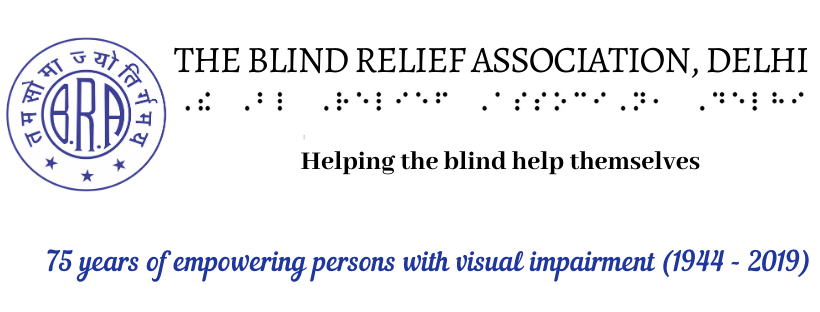Webinar – Dealing With Psychological Challenges Of The Disabled During COVID – 19
COVID-19 has left millions of people devastated and is also taking a psychological toll on many. The situation is even more severe in case of people with disabilities. In light of these events, a webinar was organised by the Blind Relief Association’s COVID Helpline Team on ‘Dealing with psychological challenges of the disabled during COVID 19’ on 18 May 2021.
Guests
Dr Pragati Pandey, Assistant Professor, National Institute of Mental Health Rehabilitation (NIMHR) and Mr K.V.S Rao, Director, Department of Empowerment of Persons with Disabilities were invited as the Main Speaker and Special Invitee respectively. Besides holding the position of Assistant professor at NIMHR, Dr Pandey is also the Officer in Charge of Composite Regional Centre (CRC), Lucknow.
Platform & Audience
The webinar was conducted on Google Meet and simultaneously streamed live on YouTube and Facebook page of the Blind Relief Association. The webinar was attended by 120 members on Google Meet and by over 500 on YouTube and Facebook. The audience included B.R.A. management members, Helpline team (counsellors, frontline call receivers, logistic team) special education students, school teachers, social workers, and others working with persons with visual and other disabilities.
Session
Mr Kailash Chandra Pande, Executive Secretary of the Blind Relief Association welcomed the gathering and spoke about the impact of COVID-19 pandemic on the society and the psychological challenges associated. The session was moderated by Dr Nikhil Jain, Associate Professor, Dyal Singh College.
Mr. K.V.S. Rao
Mr Rao deliberated the steps taken by the government to mitigate the situation, its future readiness and various policy decisions in handling the current pandemic. He spoke about Rights of Persons with Disabilities Act, 2016 and how it was different from the Act of 1996 strengthening the hands of government in dealing with various situations affecting the disabled and the important sections of the act such as Section 3, 8, 25 and 40 to 46 etc.
Mr Rao apprised the various measures taken by the Department of Empowerment of Persons with Disabilities since March 2020 (start of the pandemic) such as training emergency personnel in dealing with PWD patients, relaxing lockdown restrictions in case of PWDs, exempting PWD employees from physically attending office, 24*7 helpline at state level exclusively for PWDs and collaborating with NGOs in dealing the issues related to PWDs.
Mr Rao elaborated the works done by the various central ministries to help persons with disabilities in these tiring times such as:
- Ministry of Rural Development providing ex-gratia pension to PWDs
- Department of Personnel providing an exemption for PWDs from physically attending work.
- Department of Food and Public distribution providing rations to PWDs in need
- Ministry of Health providing valuable advice to state government in dealing with conditions of PWDs during the pandemic.
He informed that the Department of Empowerment of Persons with Disabilities started issuing Unique Disability Identity Card (UDID) to all the eligible persons. The Department has also requested state governments to issue online disability certificates to avoid inconveniences during the pandemic. Community Based Inclusive Development (CBID) workers are trained to work in tandem with ASHA workers to help the PWDs at local level.
Mr Rao commended the efforts of B.R.A for their work towards the visually challenged and resolved the queries posed by participants.
Dr. Pragati Pandey
Dr Pragati Pandey initiated the session by explaining the stress caused by the pandemic, more evidently affecting patients kept in isolation where they do not receive proper mental care. She explained the double fold difficulties that persons with disabilities face in isolation.
Dr Pandey encouraged discussing constructive topics such as vaccinations and precautions instead of dwelling on negative aspects, when talking about COVID with friends and families. She also suggested that one must share their fears, negative thoughts and anxieties to reduce feelings of stress and suicidal thoughts.
Dr Pandey further explained the ways in which persons with disabilities can manage stress and the role played by their family members, caregivers and the various strategies that can be adopted by them. She pointed that the first step is finding the cause for the stress and figuring out if the stress is recurrent due to any physical or psychological reason. She insisted on taking professional help or the help of family and friends in dealing with it. She highlighted that stress can decrease to a large extent when there is a proper platform to vent one’s feelings. In this context, she praised the Helpline launched by B.R.A and commended the role played by them in providing emotional support to the visually challenged.
Dr Pandey encouraged the Helpline Team members to not be stressed themselves on receiving distress calls, and suggested cultivating active listening skills, asking open ended questions, providing space for the callers to fully vent their feelings, using distraction if needed in extreme cases, proposing relaxation techniques (such as breathing exercises) and similar micro counselling skills. She suggested having recreational activities from time to time, occasionally taking breaks, and seeking help from other mental health professionals instead of self-diagnosing their condition.
At the end of Dr Pragati’s session, the house was opened for questions from the audience on Google meet, YouTube and Facebook.
Upon finishing an interactive Q&A session, Mr Ramdas Shivhare, an alumnus of the Blind Relief Association delivered the vote of thanks.
Link to the Webinar: https://www.youtube.com/watch?v=AnSkw3jLb8k&t=1s


